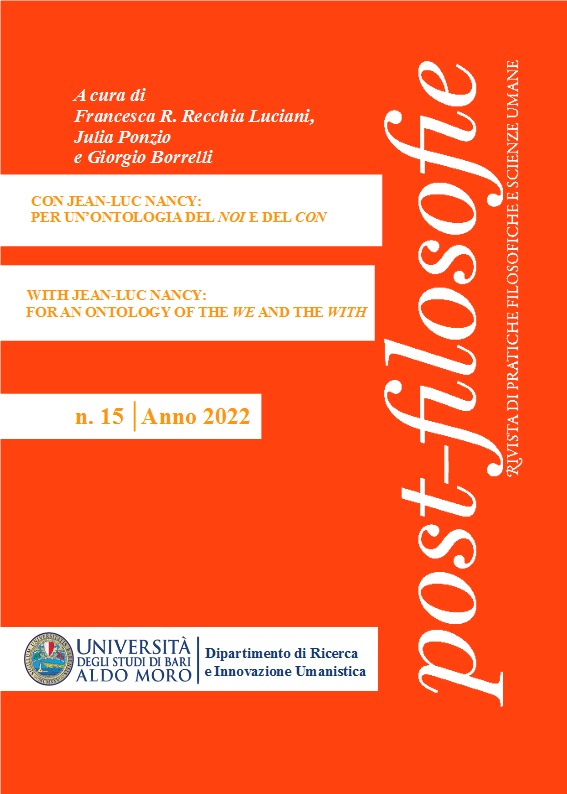Sans salut. Etre partout où est la vie
DOI:
https://doi.org/10.15162/1827-5133/1823Parole chiave:
Jean-Luc Nancy, Metafisica, Religione, Respiro, Breath, Metaphysics, Religion, Métaphysique, SouffleAbstract
Come testimoniare il respiro di un amico? Come dire che lo spirito respira ancora e sempre, che non smetterà mai di soffiare, senza che questo respiro si identifichi con un avatar ontoteologico da cui Jean-Luc Nancy ci ha messo in guardia? La storia della religione e della metafisica si è talmente permessa il privilegio dell’oltre che la parola che la libera rischia di essere ostaggio di ciò da cui è stata a lungo esiliata. Pazienza, dobbiamo correre questo rischio. Jean-Luc Nancy amava citare questa frase di Ingeborg Bachmann: “Ogni persona che cade ha le ali”.
Diciamo, per farla breve e dolce, che le ali su cui si dispiega il respiro di Jean-Luc Nancy non hanno né inizio né fine. È un’emersione. Il sopraggiungere del respiro, si potrebbe dire, una parola cara a Nancy. Un respiro che si avvicina, che vive e muore all’infinito, là dove sorge, inaspettatamente.
How to witness the breath of a friend? How to say that the spirit still and always breathes, that it will never stop blowing, without this breath being identified with an onto-theological avatar that Jean-Luc Nancy has warned us against? The history of religion and metaphysics has so afforded itself the privilege of the “beyond” that the word that liberates it risks being hostage to that from which it has long been exiled. Too bad, we have to take that risk. Jean-Luc Nancy was fond of quoting this line from Ingeborg Bachmann: “Every person who falls has wings”.
Let us say, to keep it short and sweet, that the wings on which Jean-Luc Nancy’s breath unfolds have no beginning and no end. It is an emergence. The coming of the breath, one might say, a word that Nancy cherished. An approaching breath that lives and dies infinitely, where it rises, unexpectedly.
Riferimenti bibliografici
BACHMANN, I., Toute personne qui tombe a des ailes, trad. fr. F. Rétif, Gallimard, Paris 2015.
NANCY, J-L., Heidegger et la vie sans mort, «le Nouvel Observateur», n. 2019, 17-23 julliet 2003.
―, À la vie, à la mort ? Entretien avec Jean-Luc Nancy, «Philosophie magazine», 24 août 2021
―, Que faire ? Paris, Galilée, 2016.
―, La Peau fragile du monde, Galilée, Paris 2020.
Downloads
Pubblicato
Fascicolo
Sezione
Licenza
“Post-Filosofie” utilizza Open Journal Systems 2.4.8.5, che è un software open source per la gestione e la pubblicazione di riviste sviluppato, supportato e distribuito gratuitamente dal Public Knowledge Project sotto la GNU General Public License.
Gli autori che pubblicano su questa rivista accettano le seguenti condizioni:
- Gli autori mantengono i diritti sulla loro opera e cedono alla rivista il diritto di prima pubblicazione dell'opera, contemporaneamente licenziata sotto una Licenza Creative Commons - Attribuzione che permette ad altri di condividere l'opera indicando la paternità intellettuale e la prima pubblicazione su questa rivista.
- Gli autori possono aderire ad altri accordi di licenza non esclusiva per la distribuzione della versione dell'opera pubblicata (es. depositarla in un archivio istituzionale o pubblicarla in una monografia), a patto di indicare che la prima pubblicazione è avvenuta su questa rivista.
- Gli autori possono diffondere la loro opera online (es. in repository istituzionali o nel loro sito web) prima e durante il processo di submission, poichè può portare a scambi produttivi e aumentare le citazioni dell'opera pubblicata (Vedi The Effect of Open Access).
"Post-Filosofie" uses Open Journal Systems 2.4.8.5, which is an open source journal management and publication software developed, supported and distributed free of charge by the Public Knowledge Project under the GNU General Public License.
Authors publishing in this journal accept the following conditions:
- Authors retain the rights to their work and assign to the journal the right of first publication of the work, simultaneously licensed under a Creative Commons Licence - Attribution that allows others to share the work indicating intellectual authorship and first publication in this journal.
- Authors may enter into other non-exclusive licensing agreements to distribute the published version of the work (e.g., deposit it in an institutional repository or publish it in a monograph), as long as they indicate that the first publication was in this journal.
- Authors may disseminate their work online (e.g. in institutional repositories or on their website) before and during the submission process, as it may lead to productive exchanges and increase citations of the published work (See The Effect of Open Access).







